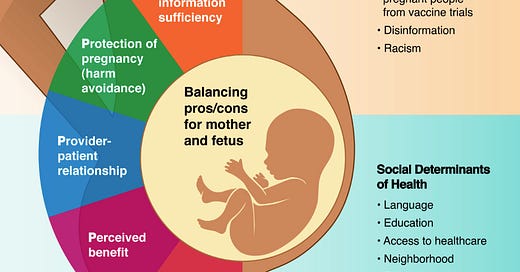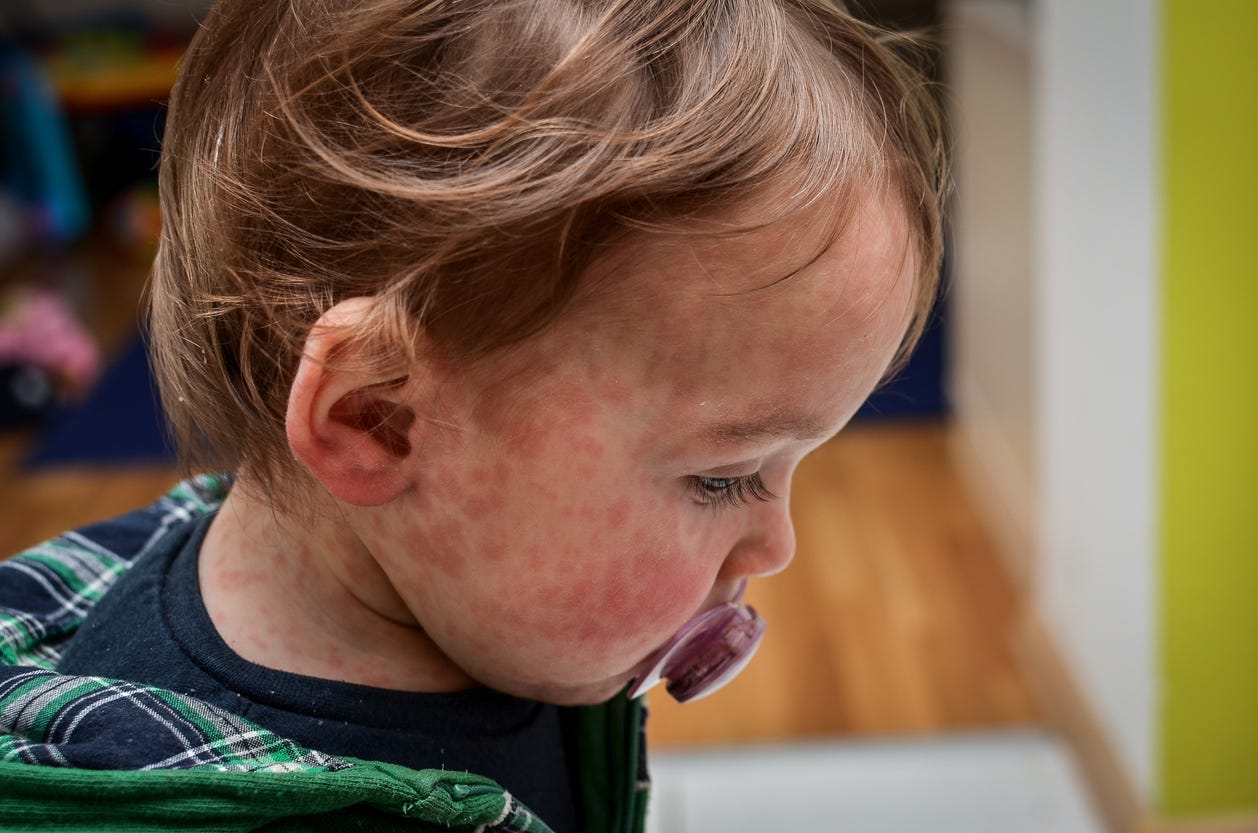Welcome to the One Vax Two Lives Newsletter where we review the latest vaccine research, public health news, and federal changes.
One Vax Two Lives has done a lot of work surrounding vaccine hesitancy and synthesized that work into a conceptual model describing what we called, “A Mother’s Dilemma” -- whether to vaccinate herself in pregnancy. Please take a look at our publication, which is open source and free to download. We would certainly appreciate your help in recognizing the important role of studying vaccine hesitancy to better understand how this decision is made in pregnancy and in other vulnerable populations.
A Mother’s Dilemma: The 5-P Model for Vaccine Decision-Making in Pregnancy
Vaccines Volume 11, Issue 7, July 2023, Pages 1248
Pregnant women are a highly vaccine-resistant population and face unique circumstances that complicate vaccine decision-making. Pregnant women are also at increased risk of adverse maternal and neonatal outcomes to many vaccine-preventable diseases. Several models have been proposed to describe factors informing vaccine hesitancy and acceptance. However, none of these existing models are applicable to the complex decision-making involved with vaccine acceptance during pregnancy. We propose a model for vaccine decision-making in pregnancy that incorporates the following key factors: (1) perceived information sufficiency regarding vaccination risks during pregnancy, (2) harm avoidance to protect the fetus, (3) relationship with a healthcare provider, (4) perceived benefits of vaccination, and (5) perceived disease susceptibility and severity during pregnancy. In addition to these factors, the availability of research on vaccine safety during pregnancy, social determinants of health, structural barriers to vaccine access, prior vaccine acceptance, and trust in the healthcare system play roles in decision-making. As a final step, the pregnant individual must balance the risks and benefits of vaccination for themselves and their fetus, which adds greater complexity to the decision. Our model represents a first step in synthesizing factors informing vaccine decision-making by pregnant women, who represent a highly vaccine-resistant population and who are also at high risk for adverse outcomes for many infectious diseases.
The Latest on Public Health News
Weekly influenza report
Nationwide, newly diagnosed influenza cases have declined for the past three weeks, although flu-related hospitalizations and deaths remain elevated. Notably, while cases have declined relative to earlier in the season, nationally influenza rates remain above the baseline influenza rates typical of this time of year. This is the first influenza season to be classified as a high severity season since 2017-2018. As of March 15, the CDC estimates that influenza infection has resulted in 43 million illnesses, 560,000 hospitalizations, and 24,000 deaths, including 151 pediatric deaths since October 2024.
Influenza infection can cause severe illness in pregnancy, and influenza vaccination is recommended for all pregnant individuals who do not have personal contraindications (such as a history of a severe reaction to prior vaccination). Nationally, 38% of women who are pregnant during the current influenza season have received the influenza vaccine, according to data from the CDC. Overall influenza vaccination rates in the U.S. among pregnant women and women of reproductive age have been declining for the past six years.
Figure: Percent of pregnant women ages 18-49 who have received the influenza vaccination overall. Source: CDC. Original data source: Vaccine safety datalink
Influenza infection during pregnancy increases the risk of severe maternal disease and death, as well as stillbirth and fetal growth restriction. There is a preponderance of evidence to support that receiving the influenza vaccination during pregnancy is not associated with an increased risk of any adverse perinatal outcomes. The vaccination is highly effective at protecting against severe infection, reducing the risk of hospitalization for flu-related illness in pregnant women by at least 40% according to data from a 2018 study.
Sources:
The Measles Resurgence
A Public Health Threat Undermining Decades of Progress
Childhood vaccination rates are declining globally, driven by healthcare system disruptions from the COVID-19 pandemic and a rise in vaccine hesitancy. As a result, preventable diseases like measles are making a dangerous comeback. In 2023 alone, 22 million children missed their measles vaccinations, leading to a surge in cases worldwide—10.3 million infections, a 20% increase from the previous year.
This resurgence is particularly alarming given the history of measles and the profound success of vaccination programs. Before the measles vaccine became widely available in 1963, the disease was a major cause of childhood mortality. Over the past 25 years, measles vaccination has saved an estimated 60 million lives, most of them children. Yet, many parents today underestimate the severity of the virus, mistakenly believing it to be a mild illness. In reality, measles is the most contagious virus known and can lead to severe complications, including immune amnesia, which leaves children vulnerable to other serious infections for years.
The resurgence of measles serves as a stark warning: without continued public health efforts, past successes in disease prevention can quickly unravel. The measles vaccine has saved millions of lives, yet complacency and misinformation threaten to reverse decades of progress. Ensuring high vaccination coverage is not just a matter of individual choice but a collective responsibility to protect the most vulnerable.
To read more about the impact of measles on pregnancy and maternal-fetal health, you can refer to our newsletter posted on February 23rd or a publication on the Management of Obstetric–Gynecologic Patients During a Measles Outbreak from the American College of Obstetrics and Gynecologists.
Sources:
Our Resources
Go to the One Vax Two Lives website to learn more about our work and publications, access our trifold brochure, and read FAQs.
If you know someone who would like to receive our newsletter in their inbox, please share this post by clicking below. You can even share this post on social media.
Happy sharing!
Still have questions? Send us a message or a question in our Substack Chat - join here!
onevaxtwolives.substack.com/chat










This model about hesitancy in pregnancy is great!
Thank you for the restack!